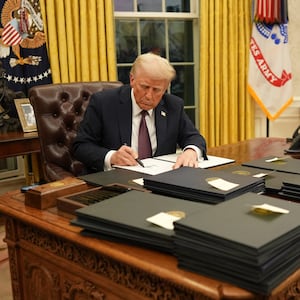Business
CEOs React as Trump Tariffs Challenge New Zealand Exporters

The recent imposition of a 15% tariff on New Zealand exports by the United States has raised concerns among local business leaders. Since taking office for a second term in January 2023, President Donald Trump has enacted significant changes to U.S. trade policy, which are now impacting New Zealand’s economy. In a survey conducted by the Herald, responses from over 150 CEOs indicated a predominantly negative view of Trump’s performance.
New Zealand exporters are feeling the effects of the tariff, which has added pressure to an industry already grappling with global trade uncertainties. The 2025 CEOs Survey highlighted that only two respondents rated Trump’s actions as “very impressive.” The sentiment among CEOs reflects a broader apprehension about the evolving trade climate under Trump’s administration.
Mixed Reactions from Business Leaders
Despite the challenges, some business leaders express a cautious optimism regarding the U.S. economy. Neil Paviour-Smith, managing director of Forsyth Barr, noted that while Trump has taken full control of U.S. policy, the fundamentals of the U.S. economy remain strong. He stated, “Looking past the noise on the obvious factors that get attention, the U.S. economy is growing and markets are at record levels, suggesting optimism in the outlook.” This perspective indicates a recognition that while the policy landscape may be shifting, the underlying economic conditions are favorable.
The concern among New Zealand CEOs is not limited to tariffs. There is also growing pressure from the U.S. for New Zealand to increase its defense budget. This request reflects the United States’ strategic interests in the Asia-Pacific region and its expectations of allies to contribute more to regional security.
Implications for New Zealand Exporters
The introduction of the tariff is expected to complicate trade relationships between New Zealand and the United States, which is a key market for various exports. Industries such as agriculture and manufacturing, which rely heavily on American consumers, may face increased costs and reduced competitiveness.
In light of these developments, New Zealand’s business leaders are urged to reassess their strategies to navigate the new reality of U.S. trade policy. As the global trade environment evolves, adaptability will be crucial for maintaining market access and sustaining growth.
The overall mood among New Zealand’s business community is one of caution, as they grapple with the implications of Trump’s policies. As the situation unfolds, the focus will remain on how these changes will shape trade dynamics and the broader economic landscape in the coming years.
-

 World4 months ago
World4 months agoTest Your Knowledge: Take the Herald’s Afternoon Quiz Today
-

 Sports4 months ago
Sports4 months agoPM Faces Backlash from Fans During Netball Trophy Ceremony
-

 Lifestyle4 months ago
Lifestyle4 months agoDunedin Designers Win Top Award at Hokonui Fashion Event
-

 Entertainment5 months ago
Entertainment5 months agoExperience the Excitement of ‘Chief of War’ in Oʻahu
-

 Sports4 months ago
Sports4 months agoLiam Lawson Launches New Era for Racing Bulls with Strong Start
-

 World5 months ago
World5 months agoCoalition Forms to Preserve Māori Wards in Hawke’s Bay
-

 Health4 months ago
Health4 months agoWalking Faster Offers Major Health Benefits for Older Adults
-

 Lifestyle4 months ago
Lifestyle4 months agoDisney Fan Reveals Dress Code Tips for Park Visitors
-

 Politics4 months ago
Politics4 months agoScots Rally with Humor and Music to Protest Trump’s Visit
-

 Top Stories5 months ago
Top Stories5 months agoUK and India Finalize Trade Deal to Boost Economic Ties
-

 Health2 months ago
Health2 months agoRadio Host Jay-Jay Feeney’s Partner Secures Visa to Stay in NZ
-

 World5 months ago
World5 months agoHuntly Begins Water Pipe Flushing to Resolve Brown Water Issue









